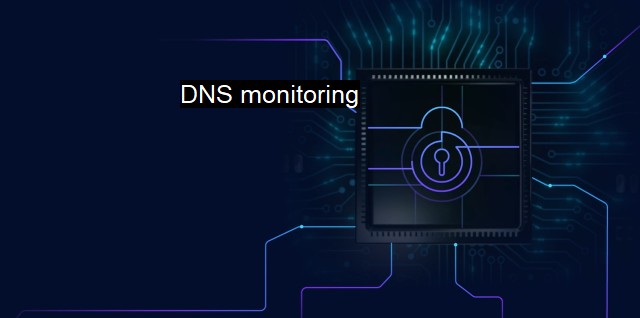What is DNS monitoring?
Diving into the Importance of DNS Monitoring in Cybersecurity and Antivirus: Tracking, Analyzing, and Actively Securing Your Network
DNS monitoring is a critical component that doesn't receive the attention it absolutely deserves. DNS stands for Domain Name System, which serves essentially as the 'phonebook' of the internet, associating domain names we know and use with their corresponding IP addresses. When a user types in a URL, the DNS system helps to translate it into the required IP address that identifies the corresponding server. The DNS operation might seem simple yet straightforward, but its function carries immense importance in a world that heavily relies on internet connection. DNS monitoring, therefore, represents a network defense strategy that gives visibility into this Domain Name Exchange process, allowing the detection, and ideally prevention, of malicious threats.To fully understand the concept, it is crucial to appreciate that while DNS servers streamline internet use for people, they also present a potent threat vector that malicious actors can exploit. Cybercriminals can manipulate DNS requests to misdirect users to fraudulent websites or create 'tunnels' that help them infiltrate networks, exfiltrate confidential data, or deliver malware payloads. With 91% of cyber-attacks starting with a DNS request, it is little wonder why organizations must consider DNS as part of their cybersecurity strategy, making DNS monitoring increasingly vital.
DNS monitoring is a proactive defense mechanism that helps businesses keep tabs on DNS server performance or any unusual traffic patterns, which could indicate a security breach. By monitoring the DNS server, organizations can identify both external and internal threats. External threats might come from cyber criminals hosting phishing sites or deploying ransomware attacks. Simultaneously, internal threats could involve unauthorized users attempting to gain access to restricted areas or botnets that direct damaging loads to your DNS servers.
More specifically, DNS monitoring allows organizations to track important metrics such as request and response times, errors in server responses, server availability, and server traffic. Detailed tracking of these metrics ensures ongoing server performance optimization, aiding in maximum server uptime, and subsequently, user satisfaction. Simultaneously, suspicious patterns indicate malicious activities, such as DNS poisoning or DNS tunneling used to bypass network firewalls or facilitate data exfiltration. Therefore, DNS monitoring is a comprehensive approach that not only guarantees smooth server operations but also fortifies network defenses.
Data captured during DNS monitoring is often analyzed in real-time, enabling prompt reactions to any unusual server performance or traffic patterns. This continued observance of DNS server health allows IT teams to immediately highlight any anomalies and respond quickly to mitigate the potential impact on the system. DNS monitoring offers historical data analysis, contributing to preventive maintenance, data-driven adaptations, and accurate cybersecurity planning.
DNS monitoring could also serve as an invaluable tool when dealing with DDoS (Distributed Denial of Service) attacks. In a typical DDoS attack, a DNS server is swamped with web traffic from various sources, making it impossible for the server to respond or operate adequately. DNS monitoring can provide an early warning system for such an imminent security threat. Besides enabling immediate corrective measures, DNS monitoring also helps understand how to prevent similar threats in the future.
One essential feature of certain advanced DNS monitoring systems is Artificial Intelligence (AI), that adds another layer of fortification. These AI-based tools inspect traffic anomalies and pinpoint their origins more accurately, even anticipate and halt potential threats before any tangible damage is incurred.
DNS monitoring is a cybersecurity strategy aimed at discerning any anomalies or threats that could compromise your network's security. Reliable DNS monitoring provides organizations with full visibility of network activities, lowers the risk of a successful cyber-attack, and helps maintain server performance. This protective umbrella over DNS servers brings peace of mind in the volatile online environment and should be an integral part of any comprehensive cybersecurity program.

DNS monitoring FAQs
Why is DNS monitoring important for cybersecurity?
DNS monitoring plays a crucial role in identifying and preventing cyber attacks. Hackers often use DNS to communicate with malware, and monitoring DNS traffic can help detect suspicious activity and potential threats.What are the benefits of using DNS monitoring for antivirus software?
By monitoring DNS traffic, antivirus software can identify and block malicious websites and domains that are associated with malware. This helps prevent the spread of malware and keeps systems secure.What types of DNS monitoring tools are available for cybersecurity purposes?
There are several DNS monitoring tools available, including network traffic analysis tools, DNS query logging and analysis tools, and real-time threat intelligence platforms that use DNS data to identify potential threats.How can businesses implement DNS monitoring for enhanced cybersecurity?
Businesses can implement DNS monitoring by using DNS server log analysis tools, deploying DNS query logging and analysis tools, or subscribing to real-time threat intelligence services that use DNS data. Additionally, businesses can work with IT security professionals to develop and implement a comprehensive DNS monitoring strategy tailored to their specific needs.| | A | | | B | | | C | | | D | | | E | | | F | | | G | | | H | | | I | | | J | | | K | | | L | | | M | |
| | N | | | O | | | P | | | Q | | | R | | | S | | | T | | | U | | | V | | | W | | | X | | | Y | | | Z | |
| | 1 | | | 2 | | | 3 | | | 4 | | | 7 | | | 8 | | |||||||